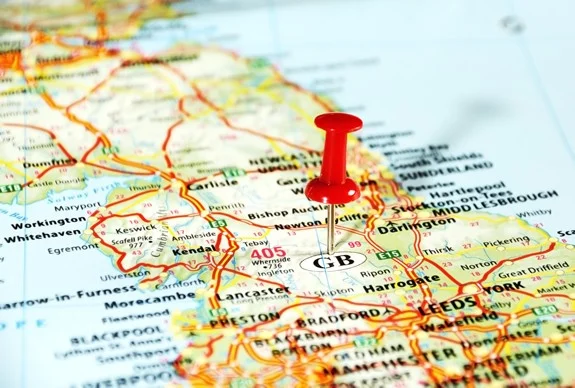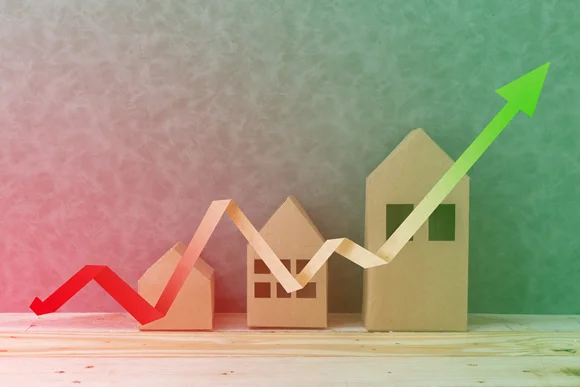House Prices Are Rising Fastest in These Key Areas
Attributed to an enormous spike of post-lockdown activity, house price growth across the UK is now averaging 3%, its highest in two and a half years. Many areas are experiencing record-high sales and property purchase queries as the market bounces back from one of its most turbulent years in recent history.
As it stands, cities in the north of England are seeing the strongest average house price growth of all. Zoopla has reported a huge 5.1% increase in average house prices in Nottingham. Manchester followed closely behind with an impressive 4.6% increase, followed by Leeds, where average house prices have climbed by 4.5%.
More importantly, Zoopla predicts that this growth will continue for the next few months at least, potentially pushing the overall average increase to 4% before the year ends.
Sales activity spikes in the south-east
Though the fastest house price increases have been recorded in the north, London and the south-east of England have recorded the biggest increases in property sales volumes.
According to Zoopla, agreed property sales in the South East for the year to date are up 15%, in contrast to the 3% average across the UK. London has also seen a huge spike in agreed property sales, up an impressive 12% year to date.
“Last year, sales volumes in southern regions were 20% lower than in 2015, which is why the rebound in demand has boosted sales so much in southern England,” Zoopla said.
Zoopla’s report also indicated that more properties are currently on the market than at the same time last year, with 18% more inventory than was available in October 2019. In addition, the average asking price for a property for sale today is around 10% higher than it was a year ago.
London has seen a wave of new inventory become available for prospective buyers, with a full 39% more homes available for purchase than at the same time in 2019.
Speaking on behalf of estate agency Jackson-Stops, Nick Leeming commented on the market’s impressive performance in the south-east of England.
“This certainly reflects what we’re seeing on the ground, with sales agreed last month among the highest on record across the Jackson-Stops network,” he said.
“Whilst there has been a notable uptick in activity across every branch, this has been particularly prevalent in the South East, with Chichester and Dorking featuring amongst the locations that saw the highest volume of new offers on properties.”
Ongoing uncertainty
Representatives from Zoopla commenting on the data suggested that property market activity across the country has become restricted because of ongoing coronavirus-related economic uncertainty.
In less affluent areas of the UK, prospective buyers are demonstrating a reluctance to commit to major purchase decisions. Whereas in communities where buyers are less dependent on conventional home loans, property sales are once again surging.
Again, this is a trend that Zoopla expects to continue for some time, particularly as the second wave of the COVID-19 crisis strengthens its grip on the UK and its economy.
House Price Growth Hits 5.8% for October, Nationwide Reports
Several major banks and lenders across the UK have released data suggesting a faster-than-expected housing market recovery is well and truly underway. Nationwide has reported exceptional house price growth for October of 5.8%, the highest recorded since January 2015.
Nationwide’s latest House Price Index has painted a positive picture for the UK’s real estate market, indicating further month-on-month growth of 0.8% for October. This followed a further 0.9% increase in September, resulting in a new average home price of £227,826.
Despite having acknowledged the somewhat sluggish pace of the UK’s general economic recovery, Nationwide insisted that the housing market is performing with unexpected strength. Economic growth for August fell to just 2.1% from July’s 6.4%, indicating that the government’s Eat Out to Help Out scheme was not quite as effective as expected.
“Market conditions also weakened with the unemployment rate rising to 4.5% in the three months to August, still low by historic standards but up from an average of 3.8% in 2019,” said Robert Gardner, Nationwide’s chief economist.
“Nevertheless, housing market activity has remained robust. Mortgage approvals for house purchases climbed to 91,500 in September, the highest level since 2007.”
“The outlook remains highly uncertain and will depend heavily on how the pandemic and the measures to contain it evolve, as well as the efficacy of policy measures implemented to limit the damage to the wider economy.”
Additional lender support is required
Commenting on the data published by Nationwide, Steve Seal suggested that lenders in general will need to do more to support prospective buyers in the foreseeable future.
“While the housing market continues to recover from the impacts of the pandemic, it is likely that many customers, particularly those who face further financial hardship beyond October, will require additional support from lenders over the coming months,” he said.
“For these borrowers, this has the potential to impact their credit score and, subsequently, their ability to secure a mainstream mortgage in the future.”
“This is why the specialist lending market will be essential for supporting underserved customers over the long term, providing them with financial solutions to cater for their specific needs.”
Ongoing economic uncertainty is likely to increase lender scrutiny when processing applications, resulting once again in delayed transactions and further challenges for borrowers. Some have called for the government’s stamp duty holiday (scheduled to expire March 31) to be extended indefinitely to boost confidence in the housing market and support sales activity.
Post-Lockdown Exodus Sees City Dwellers Flee for the Country in Record Numbers
It was not long ago that small city centre flats with the bare minimum space were the most desirable properties for movers in the UK. Given the choice, it seemed most would have liked to relocate to major employment hotspots like London, being perfectly happy to sacrifice space at home for the convenience of urban living.
Or at least, that is how the situation looked before lockdown.
According to property portal Rightmove, homebuyers in record numbers are setting their sights on quieter and more spacious homes far from crowded towns and cities. In fact, the number of searches being carried out for properties in rural locations with smaller populations has more than doubled since lockdown was enforced.
Primarily, the desire for larger homes in quieter locations is being fuelled by homework becoming the new norm for much of the population. Coupled with the fact that more people are spending more time on their own property (indoors or out) than ever before, the appeal of larger homes in quieter corners of the country is understandable.
Outdoor space is a key selling point
Seaside towns and villages in particular have spiked in popularity among homebuyers, reports Rightmove. Irrespective of whether such a move could potentially add significant mileage to a worker’s twice-weekly commute, it is apparently a small price to pay for what is on offer.
Rightmove’s report made it clear that outdoor space has become a key selling point for homes on the market in 2020. The availability and quality of a property’s gardens and outdoor living spaces are now taking precedence over previous priorities.
Whereas it was once kitchens, bathrooms, and convenient locations that sold homes, it is now manicured gardens, patios, and tranquil settings.
Are prices set to fall in 2021?
Nothing is certain for the time being, given the potential threat posed by COVID-19 and Brexit; however, some real estate watchers believe that 2021 will bring an end to record-breaking property price increases.
“There is increasing concern that the combination of significant losses over the coming months allied to the scaling back of policy initiatives in early 2021 will have an adverse impact on transaction levels,” commented Simon Robinson, chief economist at The Royal Institution of Chartered Surveyors, though this does not necessarily mean that next year’s slowdown will reverse the positive movement of the past couple of months entirely.
According to Halifax, average house prices in the UK saw their biggest monthly growth in September since 2016, a huge 7.3% spike. This took the average UK property price to a new high of £249,870.
UK House Prices Spiked By a Further 5% in September
Fears of an imminent halt to property price acceleration across the UK have been temporarily allayed after one of the country’s biggest lenders once again reported strong monthly growth.
According to the latest figures from Nationwide, average UK house prices for September saw an impressive 5% spike compared to the same month in 2019. The growth that suggests post-lockdown demand is continuing to fuel the UK property market’s impressive recent performance
Property purchase restrictions were eased
The removal of restrictions on property viewings in most parts of the UK has been credited with the stronger and ongoing recovery of the housing market.
Data published in Nationwide’s recent report suggests that not only were average property prices up an additional 0.9% in September from the previous month but that the annual rate of growth is now the highest it has been since 2016.
On a quarterly basis, average property prices were up approximately 1.7% in the three months ending September 30. At this point, the average asking price for a home in the UK stood at £226,129.
The report from Nationwide also suggested that house prices were up in most UK regions, rather than being confined specifically to the usual key areas.
“The rebound reflects a number of factors. Pent-up demand is coming through, with decisions taken to move before lockdown now progressing,” commented Robert Gardner, Nationwide’s chief economist.
Mr. Gardner also highlighted how the chancellor’s temporary holiday on stamp duty payments was continuing to drive property purchase decisions in England and Northern Ireland. Until the end of March next year, purchases of properties valued at £500,000 or less will not incur any stamp duty payments.
“Behavioural shifts may also be boosting activity as people reassess their housing needs and preferences as a result of life in lockdown,” Mr. Gardner added.
Uncertain long-term projections
While the picture is predominantly positive for the time being, economists are unwilling to rule out more turbulent times ahead for the housing market. Nationwide and several other major lenders have indicated expectations of long-term coronavirus-related implications, which may not become fully apparent for some time.
One of which is job fears among younger workers and professionals in particular, who, due to the risk of redundancy or reduced working hours, are putting home purchase plans on hold.
Government wage support is also becoming less prolific, causing many to rethink major purchase decisions in general.
The vast majority of economists and real estate experts agree that the recent record-breaking property price performance cannot last forever. Though, in most instances, I admit to being pleasantly surprised by the speed at which the market has returned to strength.
UK House Prices at Record High After Biggest Leap Since 2016
It is looking like good news for homeowners and anyone looking to sell a residential property in the near future. Once again, UK property prices have spiked above and beyond all expectations, with August having brought about the biggest monthly boost since 2016.
According to the latest figures released by Halifax, the average price for a UK home in August has reached a new high of £245,747. This indicates a monthly increase of 1.6% compared to the average house price in July, along with a huge 5.2% increase over the same month in 2019.
The figure came in slightly under the maximum year-on-year increase of 6% some analysts had predicted, though it remains remarkable. Particularly when considering the fact that the UK’s economy is still finding its feet after an extensive period of lockdown, a spike to record-high house prices is a welcome indicator of a strong recovery.
Mortgage lending activity is up 66%
This remarkable growth in average property prices has been attributed to both the Chancellor’s temporary stamp duty holiday on purchases under £500,000 and pent-up demand being unleashed on the sector post-lockdown.
In addition to the market’s impressive record performance reported by Halifax, rival lender Nationwide also indicated an impressive spike of 2% in average house prices between July and August, along with a 3.7% increase year-on-year.
Predictions of pent-up demand being released when the housing market reopened appear to have been accurate, with the Bank of England reporting an enormous 66.2% spike in mortgage lending activity between June and July. In July alone, figures suggest that more than 66,300 mortgage applications were approved by lenders in England alone.
Is there a housing bubble on the horizon?
Despite the ongoing complications brought about by the COVID-19 crisis, the UK’s housing market is nonetheless tipped for a strong recovery. Given predictions that Britain’s GDP could contract by as much as 10% this year, the housing market is expected to continue performing with strength for the immediate future, at least.
However, experts do not necessarily see the current record-breaking house price acceleration continuing, which will most likely slow over the coming months.
“Rising house prices contrast with the adverse impact of the pandemic on household earnings, and with most economic commentators believing that unemployment will continue to rise, we do expect greater downward pressure on house prices in the medium term,” commented Russell Galley, managing director of Halifax.
Meanwhile, property consultancy Knight Frank stated that while the current level of acceleration is unsustainable, property prices will continue to increase for the rest of the year. Those with larger outdoor spaces or in proximity to green spaces in particular are expected to see ongoing gains.
Nationwide Reports The Highest Ever Average House Prices
In stark contrast to the steep declines brought about by the COVID-19 lockdown, house prices have once again skyrocketed to a new record high. According to the latest figures from Nationwide, average house prices for August rose at their fastest monthly rate in more than 16 years.
Despite having experienced heavy losses in May and June, property prices spiked a full 2% in August. This took the average asking price for a home to a new high of £224,123, reported Nationwide Bank chief economist Robert Gardner.
Many economists believe, however, that the knock-on effects of the coronavirus crisis, particularly in relation to employment, may result in a steady slowdown of recent property price hikes.
An unexpectedly rapid spike
Nationwide admitted that while the release of pent-up demand among buyers was predicted to result in property price increases, the sheer speed of the market’s recovery had been “unexpected.”
The latest figures from the lender indicate that average house price growth for August has outpaced every month since February 2004. Year-on-year, average property prices were found to be up an impressive 3.7% compared to the same time last year.
A recent report from Halifax mirrored the findings of Nationwide, suggesting all-time record-high property prices during the summer.
All change in 2022?
Speaking on behalf of Nationwide, chief economist Robert Gardner stated that while the trend is likely to continue for a while, it’s unlikely the market’s huge growth will maintain its current pace long-term.
“This rebound reflects a number of factors. Pent-up demand is coming through, where decisions taken to move before lockdown are progressing,” commented Mr. Gardner.
“These trends look set to continue in the near term, further boosted by the recently announced stamp duty holiday, which will serve to bring some activity forward.”
“However, most forecasters expect labour market conditions to weaken significantly in the quarters ahead as a result of the after-effects of the pandemic and as government support schemes wind down.”
“If this comes to pass, it would likely dampen housing activity once again in the quarters ahead.”
Likewise, the Office for Budget Responsibility, the official forecaster for the government, has also predicted a decline in average house prices next year.
Interviewed by the BBC, a London-based mortgage broker also predicted that, irrespective of the market’s current buoyancy, the situation as it looks today will be temporary at best.
“Two words: a reality check. As strong as the property market is right now, it will not last,” he told the BBC.
“Demand is understandably strong after lockdown and the added bonus of the stamp duty holiday, but unemployment is rising by the day and the economic outlook is highly uncertain as the furlough scheme ends.”
“In the final months of the year, we will start to see a reversal in the current rate of house price growth.”
Home Sales Gain Momentum, Transaction Speeds up 33%
It was predicted at the height of COVID-19 that when lockdown restrictions were eventually eased, a pent-up wave of demand would be unleashed on the UK housing market. Predictions that appeared to be accurate, as new research from Zoopla suggests the speed of property sales is currently 33% faster than it was a year ago.
Examining the three months leading up to mid-August, Zoopla found that the average time taken for a three-bedroom home to sell was 24 days. In August last year, the same property would have taken an average of 36 days to sell. It is not just three-bedroom homes that are selling faster; Zoopla’s report indicated that all property types across the board are selling at an accelerated pace.
Shifting priorities
Another prediction from the COVID-19 crisis that has proved accurate is the way in which homebuyers across the UK are showing a marked shift in priorities and preferences. Though all property types are selling faster, the slowest properties to sell in most regions are now one-bedroom flats.
This has been credited to the fact that first-time buyers and movers alike have been forced to reconsider their priorities and long-term intentions in the wake of the COVID-19 pandemic.
The fact that the housing market in its entirety was put on hold for several weeks has inevitably impacted overall property sales for the year. Nevertheless, Zoopla has reported an encouraging boom in general housing market activity since the easing of lockdown restrictions, resulting in overall sales more than 75% higher than would be expected for this time of year.
“Buyer appetite has been widely attributed to pent-up demand resulting from lockdown, but it also reflects the impact on the nation as it collectively reassesses what it wants and needs from a home,” reported Zoopla.
“Quarantine has galvanised many homeowners and renters into reconsidering their housing requirements, resulting in demand for more space and changing work and commuting patterns.”
Outdoor interest
Meanwhile, the experts at Rightmove are advising property sellers and landlords to place heavier emphasis on their gardens and outdoor spaces when presenting their properties to potential buyers or tenants. Whereas the kitchen has typically been the deal-breaker for most buyers, more people than ever before are prioritising the quality and availability of outdoor living spaces.
The sudden spike in housing market activity is also having a direct impact on average property prices across the country. A recent report from Halifax suggested that in July, average home prices reached a new record high—a climb of 1.7% from the month before.
Specifically, the average property price (according to the Halifax House Price Index) stood at £241,604 for July, up from the £237,834 average recorded in June. This also indicated a huge 3.8% increase compared to the same period in 2019.
Landlords Continue to Discriminate Against Benefit Claimants, Research Suggests
In a landmark hearing that took place earlier this year, a judge ruled for the first time that blanket bans on benefit claimants by private landlords were unlawful. The “No DSS” clause has been a standard feature in countless rental contracts and tenancy agreements for decades, though it was recently declared discriminatory and in direct violation of equality laws.
Unfortunately, a new study conducted by the BBC suggests that most private landlords are in no hurry to alter their policies regarding DSS renters. Conducting an analysis on more than 9,000 Open Rent listings, the BBC found that around 75% of all private listings excluded prospective tenants on benefits.
Open Rent stated that landlords are advised to assess tenants “on their own merits” and therefore could not be held responsible for the individual policies and practices of the landlords using their website.
A wake-up call going unheard?
In the wake of the landmark ruling last month, housing charity Shelter’s chief executive insisted that the time had come for private landlords across the UK to put an end to unfair discrimination.
“Last month’s ruling should be a wake-up call for landlords and letting agents clean up their act and treat all renters equally,” commented Polly Neate.
“We won’t stop fighting DSS discrimination until it’s banished for good.”
“Open Rent should ban landlords from advertising their properties as ‘DSS not accepted’, and remind them of their legal duty not to discriminate.”
Her sentiments were shared by the Equality and Human Rights Commission (EHRC), which went further to warn landlords that claims may be filed against them if their letting policies remain discriminatory.
“These figures show that there is still some way to go before we can truly end the discrimination against women and disabled people who claim benefits,” said a spokesman on behalf of the EHRC.
“If landlords and estate agents don’t change their policies and practices, they will be at risk of claims of discrimination from would-be tenants.”
A joint responsibility
During its assessment of Open Rent, the BBC discovered that the portal continues to provide landlords with the opportunity to tick or exclude a box with the description “DSS income accepted.” Those who do not tick this box effectively restrict their listings only to those who are not on benefits at the time.
When questioned on this policy by the BBC, Open Rent remained adamant that it “fully supported Shelter’s efforts to eliminate blanket bans.”
Though at the same time added, “based on speaking to our customers, including surveying hundreds of benefit claimants directly, applicants should be made aware upfront of any conditions of renting a property.”
In addition, Open Rent claimed that some of the landlords they work with have terms and conditions in their own mortgage contracts that prohibit them from accepting DSS tenants.
“We’re committed to solving root causes like these; however, in the meantime, our customers are overwhelmingly telling us we should not be pretending the problem doesn’t exist,” said Open Rent founder Adam Hyslop.
“Hiding conditions of renting over which the landlord has no discretion only wastes time for all involved and indeed makes the situation far worse for the very people Shelter is trying to help.”








